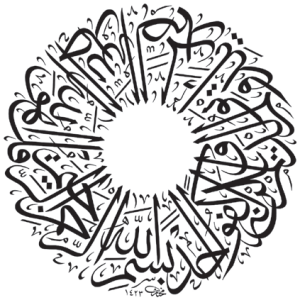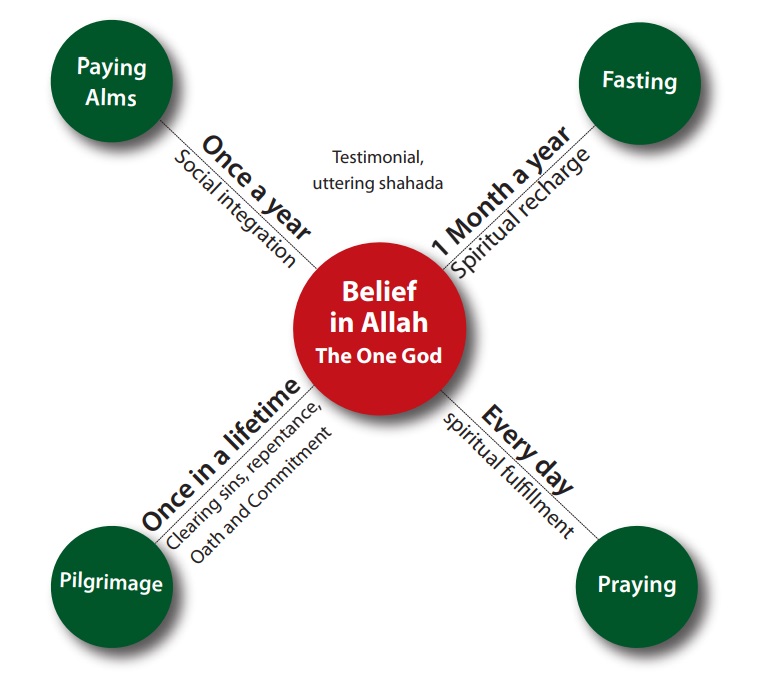Islam in simple words

“Islam” means submission and devotion to One God. It is a religion of monotheism where the adherent to Islam believes that God is one and incomparable. He has no partners or sons. He begets not nor was he begotten (neither gives birth nor was born). He created the whole universe and all beings. No one shares with Him His Divinity and no one has the right to be worshiped or prayed to but Him alone.
What is the name of God?

His name is “Allah”. It is pronounced Allah with a long vowel “a”. Also,
God has many beautiful names and attributes. Some of these attributes were mentioned in the Old Testament. For example, the name Quddous in Arabic is similar to the name Qadosh or Hakkadosh in Hebrew, which means “The Holy”.
The name Ahad in Arabic is similar to the name Echad in Hebrew, which means “The One”. In Islam, God is often described as “The Most Gracious, The Most Merciful”.
| English | Arabic | Hebrew | Aramaic |
| God | Elah | Eloha | Elaha |
Note:
In the Arabic Bible, the word Allah is frequently mentioned to indicate God. In Islam there are 99 acknowledged "beautiful names" and attributes for God.
“He is Allah besides Whom there is no God: The Knower of the unseen and the seen; He is the Beneficent, the Merciful. He is Allah, besides Whom there is no God; the King, the Holy, the Author of Peace, the Granter of Security, Guardian over all, the Mighty, the Supreme, the Possessor of greatness. Glory be to Allah from that which they set up (with Him)! He is Allah; the Creator, the Maker, the Fashioner: His are the most beautiful names. Whatever is in the heavens and the earth declares His glory; and He is the Mighty, the Wise”.
Quran 59: 22-24
Muhammad and Islam
When a man asked Muhammad to explain Islam in simple words so that he should not seek any further clarification from anyone else, Muhammad concisely said:
“Say, I believe in Allah (the one God) and then be steadfast. (i.e be steadfast in your behavior and do not deviate from the straight path).”
Embracing the Islamic faith requires following a balanced way of life without diversion to extremism in words, actions or deeds.
Islam and peace
Linguistically the word “Islam” in Arabic comes from the root word “salama”, which means free of harm and is related to the word Salaam” , which means peace. In Islam, “The Peace” is one of the magnificent names and attributes of God (Allah). The one who submits to Allah should find inner peace within him herself and should be at peace with the environment and the people.
Prophet Muhammad defined a Muslim as “the one whom other people are safe from harm coming from his tongue and hands”, i.e. people should not receive any harm from his actions and words.
It is interesting to know that in a Muslim society, people greet each other with the word “ Assalamo Alaykom” which means “peace be upon you” instead of the words “Hi” or “Hello”. The full version of this statement is “peace be upon you as well as Allah’s mercy and blessings”. You should reply to this greeting with peace declaration ”wa alaykum assalaam” “peace be upon you too”.
Muslims or Muhammadans?
Unlike the followers of other religions, the followers of Muhammad are not called Muhammadans. An adherent to Islam or the one who embraces it as a faith and a way of life is called a “Muslim” i.e. the one who believed in one God and submitted to Him.
The six elements of the Islamic creed
The belief in One God requires the belief in His Angels, His Books, His Messengers as well as the belief in the Day of Judgment and the belief in God’s Divine Pre-ordainment.
Pillars of Islam, practicing the Islamic faith
The Islamic religion is based on five pillars that a Muslim must perform.
| 1 | Shahada | Uttering (verbally saying) the creed of Islam (there is no God but Allah and Muhammad is a messenger of Allah) |
| 2 | Salat | Performing daily prescribed prayers |
| 3 | Siyam | Fasting the lunar month of Ramadan |
| 4 | Zakat | Paying alms as charity once a year |
| 5 | Hajj | Pilgrimage to the Sacred Mosque (the House of God) in Makkah once in a life time for those who have the physical and financial ability |

Pillars of Islam
1 – Uttering the Creed of Islam, Shahada

This is to acknowledge that there is one and only one God Who created all beings. His name is Allah.
A person is said to be a Muslim when he or she believes in heart and utters (acknowledges verbally) the statement of Shahada "there is no deity but Allah and Muhammad is the Messenger of Allah." (In Arabic it is spelled: Ash’hado an la Ilaha illa Allah, Wa Ash’hado anna Muhammadan rasoolo’Allah.)
Acknowledging Muhammad as a Prophet and a Messenger of God requires the acknowledgement of all Prophets and messengers God sent before him.
2 – Prescribed Daily Prayers, Salat
Prayer (Salat) in Islam is an act of worship that enables the individual to communicate with his creator and get close to Him. There are five daily prescribed prayers in Islam, which are distributed during the whole day cycle. The essence of worship is to glorify, exalt and praise God with the heart, tongue and body.

“And when My servants ask you, [O Muhammad], concerning Me – indeed I am near. I respond to the invocation of the supplicant when he/she calls upon Me. So let them respond to Me and believe in Me that they may be [rightly] guided”
Quran 2: 186
In fact, the word ‘salat’ literally means ‘hot connection’. It is a practical demonstration of faith. Each prayer includes physical movements of bowing and prostrating to Allah. Prayer show progressively increasing levels of submission to Allah. It requires full concentration and isolation from worldly matters. Prophet Muhammad said: “A person is closest to Allah during prostration.”
Praying five times a day may seem excessive to some people. In reality, it is a type of meditation that does not take more than forty minutes a day. Just as we eat three or four times a day and we never complain because we need physical nourishment to survive, we also need spiritual nourishment for our soul. Salat at spaced intervals throughout the day provides such spiritual nourishment.
3 – Zakat, Alms Giving
Zakat is an essential pillar of Islam. It means giving alms (paying a charity) once every year to poor, needy and other rightful beneficiaries as stipulated by the Quran. It is specified with (2.5%) of excess personal wealth.
Zakat cleanses one’s heart from greed and removes hatred and jealousy from the hearts of the poor. It fosters social integration and collaboration, compassion and respect. It enhances the wellbeing of the whole society and achieves social justice.
4 – Fasting in Ramadan
Muslims are required to fast the whole lunar month of Ramadan (29 or 30 days), from the break of dawn to sunset. During the fasting time, Muslims are required to abstain from eating, drinking and sexual contact while practicing a normal life.
Fasting for the sake of Allah helps acknowledge that the sustenance (that may be taken for granted) actually comes directly from Allah.
When people feel the pangs of hunger, they experience the suffering needy people go through specially in regions where people are starving or lack the basic sustenance. The rich will be more inclined to give charity when they fast. This builds up a relationship between the rich and the poor and helps build social harmony.
Fasting enables one to curb the inner desires, learn self-control and hence achieve better spiritual development. Fasting has many health benefits and doctors recommend it to cure some diseases.
Lunar Months
| 1 | Al-Muharram |
| 2 | Safar |
| 3 | Rabi’ Al-Awal |
| 4 | Rabi’ Al-Akharah |
| 5 | Jumada Al-Oula |
| 6 | Jumada Al-Akharah |
| 7 | Rajab |
| 8 | Sha’ban |
| 9 | Ramadan |
| 10 | Shawwal |
| 11 | Zul Qui’da |
| 12 | Zul Hijjah |
5 – Pilgrimage to Makkah, Hajj
Hajj is the pilgrimage to Makkah at the lunar month of Zul Hijjah with the intention to visit the Sacred Mosque (House of Allah) and perform certain religious rites. It is the fifth pillar of Islam that must be done once in a lifetime by all Muslims (who reached the age of puberty) provided they have the financial and physical ability to perform it.
As people from all races and nations gather at the spiritual epicenter of the Islamic world, they are affirming their common paternal ancestry with Adam and their spiritual ancestry with Abraham.